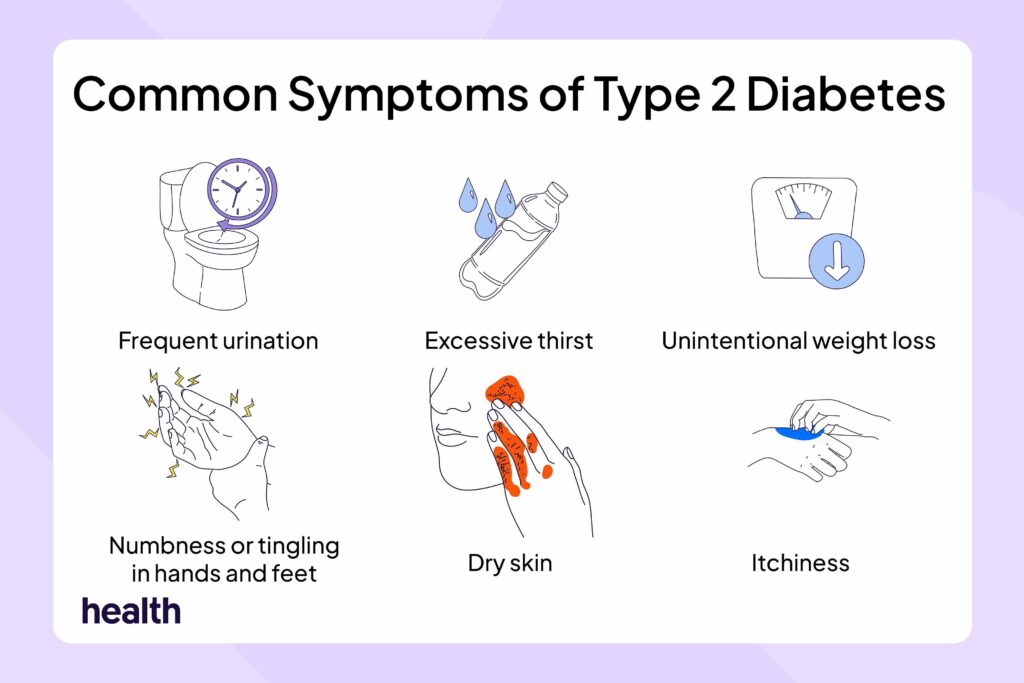Diabetes is a common condition that affects about 38 million people in the United States, and nearly 95% of those diabetes cases are type 2 diabetes. Potential symptoms may include frequent peeing, extreme thirst, dry and itchy skin, and dark, velvety patches on the skin.
Most cases of diabetes are preventable if you eat a balanced diet, maintain the ideal weight discussed with your healthcare provider, and exercise regularly. Knowing the early signs and symptoms of diabetes can help you get the help you need and prevent long-term complications.
Knowing the early warning signs and symptoms of diabetes can help make sure you get the care you need. It can also help you get an early diagnosis and lower the risk of complications.
Some common symptoms and warning signs of type 2 diabetes include:
- A lot of peeing, often at night
- Irritability
- Dark, velvety patches of skin
- Impotence or erectile dysfunction (inability to have or maintain an erection)
- Extreme thirst or wanting to drink a lot
- Weight loss without trying
- Extreme hunger
- Blurry vision
- Numbness or tingling in the hands or feet
- Extreme fatigue or exhaustion
- Very dry skin
- Itchiness
- Sores, cuts, or bruises that heal slowly
- Repeated skin infections, yeast infections, or urinary tract infections (UTIs)
Can You Be Asymptomatic?
Type 2 diabetes can develop slowly. Which means you can have mild symptoms you don’t immediately notice, or may be asymptomatic. Many people with this condition can go undiagnosed for a long time, especially if they don’t have bloodwork done regularly.
Untreated type 2 diabetes can lead to vascular (vein) and heart conditions. Most experts in diabetes care recommend knowing the condition’s early warning signs as well as letting your healthcare provider know if you have a family history of diabetes or if you think you may have gestational diabetes, a type of diabetes that develops while pregnant.
Certain factors can raise your risk of developing type 2 diabetes. You may have a higher risk if you:
- Are a higher weight than discussed with your provider, or experience obesity
- Have a parent or sibling with type 2 diabetes
- Exercise less than three times per week
- Are 45 or older
- Have nonalcoholic fatty liver disease, a condition that causes fat buildup in the liver
- Give birth to a baby who weighs more than nine pounds
- Have gestational diabetes
- Smoke cigarettes, vape, or have exposure to secondhand smoke
- Have untreated high blood pressure
- Are African American, Hispanic/Latino, American Indian, or Alaska Native
Finding type 2 diabetes or even pre-diabetes early can help delay or prevent developing serious complications and benefit your overall health.
For example, early detection can significantly lower your risk of:
- Heart disease
- Stroke
- Peripheral artery disease, which lowers blood flow to the arms and legs
- Kidney damage
- Diabetic retinopathy, which damages the blood vessels in the eyes and can lead to vision issues and blindness
- Nerve damage (neuropathy)
Talking to a healthcare provider can help keep your blood sugar under control, reduce your risk of complications, and even prevent the onset of complications. If you have a family history of diabetes, if you’re over 45 and experiencing obesity, or are a higher weight than what you discussed with your provider, you may want to have your glucose levels checked regularly.
If you already have some of the early warning signs of diabetes, make sure you let your healthcare provider know. A healthcare provider can run some tests to see if you have pre-diabetes or diabetes.
Early warning signs may include:
- Fatigue
- Unexplained weight loss
- Dry mouth, itchy skin
- Frequent peeing
- Repeated infections
- Velvet-like patches of skin
Knowing the early signs and symptoms of type 2 diabetes can help you lower your risk of developing complications. Some common symptoms include the need to pee more frequently, feeling extremely thirsty, having dry and itchy skin, and getting dark, velvety patches on the skin.
It’s possible to be asymptomatic, so you should ask to monitor your glucose levels, especially if you have a family history of diabetes. If you are diagnosed with pre-diabetes or diabetes, there are steps you can take to lower your need for medication. Work with your provider to manage your blood sugar levels and minimize complications, potentially even reversing the condition.


